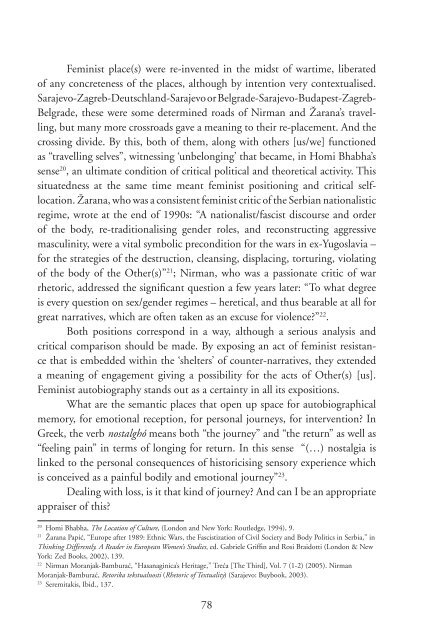Teaching Subjectivity. Travelling Selves for Feminist ... - MailChimp
Teaching Subjectivity. Travelling Selves for Feminist ... - MailChimp
Teaching Subjectivity. Travelling Selves for Feminist ... - MailChimp
You also want an ePaper? Increase the reach of your titles
YUMPU automatically turns print PDFs into web optimized ePapers that Google loves.
<strong>Feminist</strong> place(s) were re-invented in the midst of wartime, liberated<br />
of any concreteness of the places, although by intention very contextualised.<br />
Sarajevo-Zagreb-Deutschland-Sarajevo or Belgrade-Sarajevo-Budapest- Zagreb-<br />
Belgrade, these were some determined roads of Nirman and Žarana’s travelling,<br />
but many more crossroads gave a meaning to their re-placement. And the<br />
crossing divide. By this, both of them, along with others [us/we] functioned<br />
as “travelling selves”, witnessing ‘unbelonging’ that became, in Homi Bhabha’s<br />
sense 20 , an ultimate condition of critical political and theoretical activity. This<br />
situatedness at the same time meant feminist positioning and critical selflocation.<br />
Žarana, who was a consistent feminist critic of the Serbian nationalistic<br />
regime, wrote at the end of 1990s: “A nationalist/fascist discourse and order<br />
of the body, re-traditionalising gender roles, and reconstructing aggressive<br />
masculinity, were a vital symbolic precondition <strong>for</strong> the wars in ex-Yugoslavia –<br />
<strong>for</strong> the strategies of the destruction, cleansing, displacing, torturing, violating<br />
of the body of the Other(s)” 21 ; Nirman, who was a passionate critic of war<br />
rhetoric, addressed the significant question a few years later: “To what degree<br />
is every question on sex/gender regimes – heretical, and thus bearable at all <strong>for</strong><br />
great narratives, which are often taken as an excuse <strong>for</strong> violence?” 22 .<br />
Both positions correspond in a way, although a serious analysis and<br />
critical comparison should be made. By exposing an act of feminist resistance<br />
that is embedded within the ‘shelters’ of counter-narratives, they extended<br />
a meaning of engagement giving a possibility <strong>for</strong> the acts of Other(s) [us].<br />
<strong>Feminist</strong> autobiography stands out as a certainty in all its expositions.<br />
What are the semantic places that open up space <strong>for</strong> autobiographical<br />
memory, <strong>for</strong> emotional reception, <strong>for</strong> personal journeys, <strong>for</strong> intervention? In<br />
Greek, the verb nostalghó means both “the journey” and “the return” as well as<br />
“feeling pain” in terms of longing <strong>for</strong> return. In this sense “(…) nostalgia is<br />
linked to the personal consequences of historicising sensory experience which<br />
is conceived as a painful bodily and emotional journey” 23 .<br />
Dealing with loss, is it that kind of journey? And can I be an appropriate<br />
appraiser of this?<br />
20<br />
Homi Bhabha, The Location of Culture, (London and New York: Routledge, 1994), 9.<br />
21<br />
Žarana Papić, “Europe after 1989: Ethnic Wars, the Fascistization of Civil Society and Body Politics in Serbia,” in<br />
Thinking Differently. A Reader in European Women’s Studies, ed. Gabriele Griffin and Rosi Braidotti (London & New<br />
York: Zed Books, 2002), 139.<br />
22<br />
Nirman Moranjak-Bamburać, “Hasanaginica’s Heritage,” Treća [The Third], Vol. 7 (1-2) (2005). Nirman<br />
Moranjak-Bamburać, Retorika tekstualnosti (Rhetoric of Textuality) (Sarajevo: Buybook, 2003).<br />
23<br />
Seremitakis, Ibid., 137.<br />
78

















